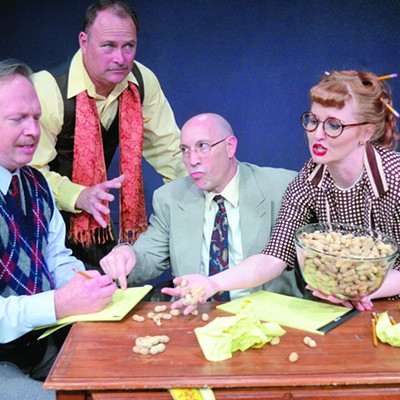Scientists and Skeptics
Stephen Schneider speaks on climate change3:30 p.m., Thursday, March 27
Gallagher Theater
UA Student Union
1303 E. University Blvd.
climatechange.net
Nationally renowned climatologist Stephen Schneider was researching plasma physics in the early 1970s when he took a course in climate change. He recalls his initial reaction.
"They said dust and smoke can cool the climate, and greenhouse gasses can heat it," he remembered. "I said no way."
By the end of the semester, his skepticism dissolved, and Schneider swapped fields to pursue climate-change research. Now a professor at Stanford University, he's spent the last 3 1/2 decades combating other people's skepticism about global warming. "Climate change is unequivocally happening, most of it due to human activities," Schneider says. "Science should be skeptical, but when you refuse to look at the vast preponderance of evidence and point to one or two exceptions to disprove it all, you're being a denial-ist."
Setting aside the stubborn assery of people like Michael Crichton and Rush Limbaugh, the skepticism has waned; most people these days accept global warming as scientific fact. Scientists like Schneider now focus on trying to figure out not if the climate is changing, but how, how fast and to what effect.
"The object now is not to stop climate change--it's too late. We are trying to stop very drastic climate change, which is doable," says Schneider. He proposes a three-pronged approach involving private-public partnerships to research and invent new greener technologies; international environmental performance standards; and a system to punish violators. "There's (currently) no tailpipe fee, no smokestack fee. ... It's a distortion of the market not to charge people for the cost of what they're doing."
Dr. Schneider will provide a more-thorough discussion on climate change and possible solutions during his free lecture at the UA. --A.M.
The Long-Awaited Novel
Junot Díaz reading8 p.m., Monday, March 24
UA Poetry Center
1508 E. Helen St.
626-3765; poetrycenter.arizona.edu
Speculation abounded during the 11 years between the publication of Junot Díaz's debut story collection, Drown, and his follow-up novel, The Brief Wondrous Life of Oscar Wao. It's not hard to see why: Drown racked up major literary awards, and The New Yorker hailed Díaz as one of the top writers for the 21st century. Those are some pretty hefty expectations.
In an e-mail exchange, Díaz explained that the real reason for the hiatus was quite simple: "It took a long time because this book was complicated as hell, and because I'm pretty damn lazy. I got up every day to work, every damn day, but at least once a month, I would give up in despair."
Was the novel worth the wait? The answer, apparently, is a resounding yes. Released to near-universal acclaim (including top awards), The Brief Wondrous Life of Oscar Wao shouldn't be wholly unfamiliar to Díaz fans: It's based on an old short story of the same name, and Drown's Yunior is back, though no longer the center of attention.
Díaz emigrated from the Dominican Republic at a young age, an experience shared by many of his characters, Yunior and Oscar included. I was surprised when Diaz said his fiction isn't really "about" the immigrant experience.
"Drown, to me, was more about how certain kinds of Dominican boys are made. Oscar Wao feels like it's more about the dangers and consequences of tyranny," said Díaz, though he adds: "But then again ... artists are notoriously unreliable about their own work."
The reading is free and open to the public. --A.M.
Supernatural Suspense!
"From a Place of Darkness" Tucson Premiere7 p.m., Tuesday, March 25
Loft Cinema
3233 E. Speedway Blvd.
322-5638; loftcinema.com
Think 8 mm (without Nicolas Cage). Now add some ghosts and other paranormal activity, and you're probably imagining something close to From a Place of Darkness.
The film follows Miles Kody (Travis Schuldt) and his descent into the world of snuff movies. He's attempting to make a documentary about the genre, but then he begins seeing ghosts of victims of snuff films--and things go wild from there.
"Everyone pigeonholes these films into the horror genre," said Douglas Raine, the writer, producer and director of From a Place of Darkness. "I think of it more as a supernatural suspense film."
The Loft Cinema is hosting the Tucson premiere of the film; admission costs $5 in advance, or $8.50 on the day of the show. Following the screening, Raine will participate in a Q&A regarding the film and the process of creating it.
But some questions regarding the creative process can be answered now. Raine said around 90 percent of the filming was done in the Tucson and Phoenix area, with the remaining 10 percent done in Los Angeles "for some shots of gore and nudity," something Raine wasn't particularly excited about.
The actors have experience in works including solid TV shows and/or older well-known films. Schuldt plays Keith on Scrubs; Bronson Pinchot was in the Beverly Hills Cop movies (and who can forget his stint as Balki from Perfect Strangers!); and John Savage has numerous credits including The Deer Hunter.
Raine summarized the film as depicting the discovery and decisions between light and dark--good and bad. You can see for yourself at the Tucson premiere. --M.K.
'Failure' Comes to Tucson
Philip Schultz reads from his new collection of poems7 p.m., Monday, March 24
Tucson Botanical Gardens
2150 N. Alvernon Way
743-8214
His friends told him not to. Literary reviewers said the same. But Philip Schultz did it anyway: He released his recent poetry collection with the title Failure.
Despite concerns about leaving his work open to endless negative puns, Schultz stuck with the title, because failure was the book's theme.
"What else could I call it?" Schultz asked.
In the end, things worked out. The puns that showed up in print remained positive, some proclaiming: "anything but a Failure." And the book is now Schultz's most successful work, he said.
"I think people identify with it," Schultz said. "Everybody in some way feels like they haven't achieved what they want to."
As for Schultz, the failure that inspired him to probe the subject was not his own, but his father's. The inspiration came following a conversation with a friend. During a casual lunch, the conversation became extremely personal as Schultz and his friend began discussing their childhoods and their fathers.
Schultz went home, and for the first time, he began writing with a purpose to explore what failure is, and what it means. The final poem offers one of the many answers to Schultz's queries. It follows a man who walks dogs for a living, a profession that brings him to swanky apartments and to an animal he desperately wants to own, but cannot afford.
"He wouldn't see himself as a failure, though others might." Schultz said. "This guy, who has next to nothing, has found a way to be content." And Schultz said he believes that is what success can be measured by--happiness.
The Tucson Writers Studio, a branch of the original writers' studio that Schultz created in New York City, will present Schultz and a reception/book-signing following the reading. A $5 donation is suggested, but nobody will be turned away due to a lack of funds. --M.K.







